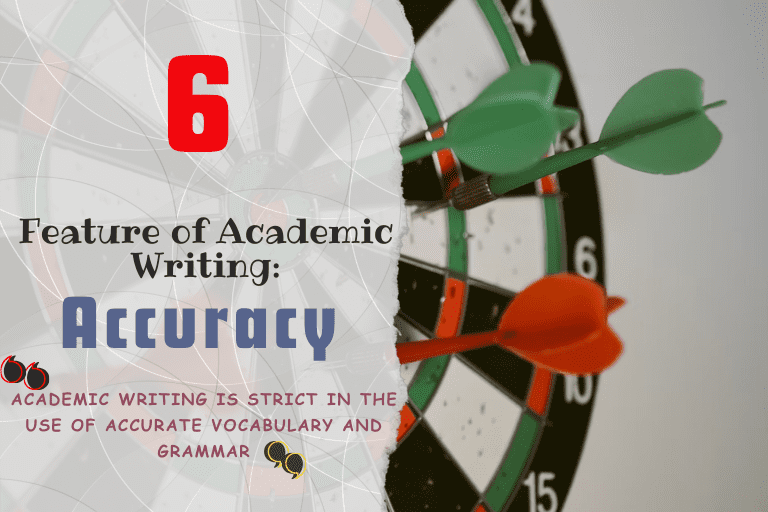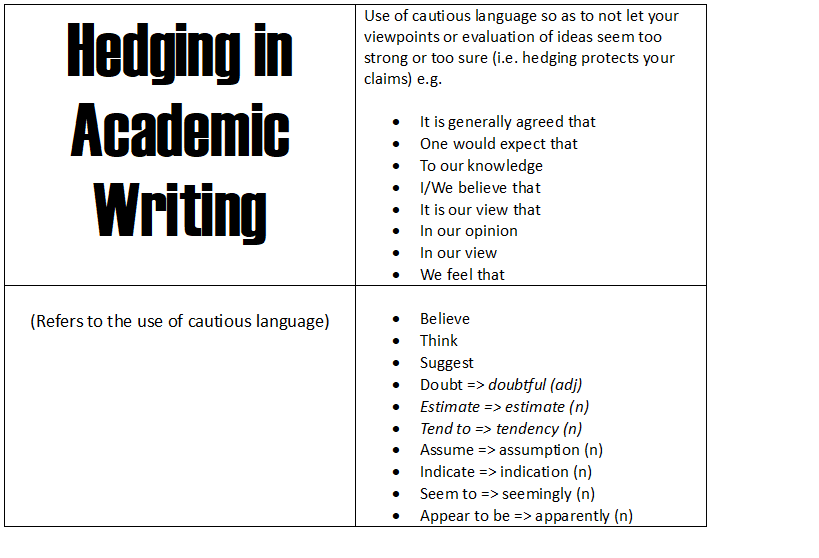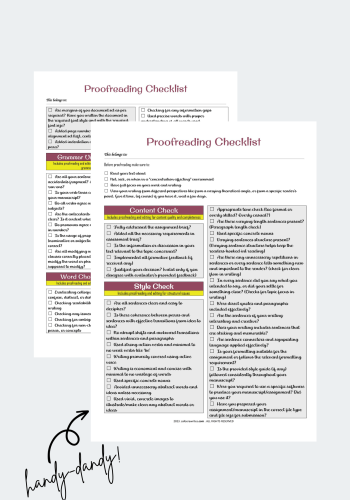Table of Contents
ToggleIntroduction
This site contains affiliate links, view the disclosure for more information.
Being a writing style that is more than a mere convention, academic writing is formal and utilizes some language norms that you must be aware of to completely understand the linearity of this writing style.
Linearity in writing implies that the content written is centered around one main central point or theme and every part of the content contributes to the main line of argument; that is your central idea. This means that academic writing progresses without digressions and repetitions intending to inform rather than entertain.
Reading the 10 features of academic writing discussed below, you’ll notice that academic writing is to some extent complex, explicit, formal, objective, confined, and responsible.
Complexity

You might have observed that compared to spoken English, written texts are lexically more dense. This simply means that in academic writing, you convey a message in a shorter text, making use of more complex words and phrases. The overall academic writing gets complex because it includes:
- More noun-based phrases
- More nominalizations
- More lexical variations
- More subordinate clause
- More “that/to” complement clauses
- More long sequences of prepositional phrases
- More attributive adjectives
- More passives
Example: Consider below the two sentences, both mean the same, however, one is the spoken variant of the written text.
Spoken Variant: The cities in Switzerland had once been peaceful, but they changed when people became violent.
Written Text Variant: Violence changed the face of once peaceful Swiss cities.
Similarly;
Spoken Variant: Because the technology has improved it is less risky than it used to be when you install them at the same time, and it doesn’t cost so much either.
Written Text Variant: Improvements in technology have reduced the risks and high costs associated with simultaneous installation.
Note that the main difference here is the grammar and not the vocabulary.
Also, do note that complexity being one of the important features of academic writing does not imply you get tempted to use complex language, fancy words, or expressions in your writing just to make it look more ‘academic’.
Formality

Another one of the important features of academic writing is Formality. As a formal language, academic writing requires you to avoid the use of colloquial terms and abbreviations like:
- Colloquial Words like “stuff”, “a lot of”, “thing”, “sort of”, etc.
- Abbreviated forms like: “couldn’t”, “shouldn’t”, “doesn’t”, etc.
- Two-word verbs like: “put off”, and “bring up”
- Asking questions
- Avoiding the use of subheadings, numbering, and bullets in formal essays only – however, using them, where necessary, in reports
Example:
With women especially, there is a lot of social pressure to conform to a certain physical shape.
Formal Equivalent: With women especially, there is a great deal of social pressure to conform to a certain physical shape.
Significantly, even at this late date, Lautrec was considered a bit conservative by his peers.
Formal Equivalent: Significantly, even at this late date, Lautrec was considered somewhat conservative by his peers.
Precision

The very objective of academic writing is to convey information and so precision is amongst the fundamental features of academic writing.
Precision in writing implies choosing the right words for intended purposes; that is to be selective in an effort to clearly convey the purpose and meaning of the writing.
Precision is important as it allows readers to clearly and easily follow your methodological procedures and argument. It adds credibility, perception of accuracy, and validity of your claim to your writing.
Example: When using information, or adding dates or figures in academic writing, precision must not be overlooked. For instance, you should avoid “a lot of people” when you could write precisely as “20 million people”.
Objectivity

The reason that academic writing makes use of nouns (and adjectives) rather than verbs (and adverbs) is that the style of writing is highly formal, wherein, the main emphasis should always be on the information to be conveyed rather than about the writer.
In other words, you would be avoiding words like: “I”, “me”, and “myself” because any idea or argument not referenced will automatically be assumed by the reader to be your own, and so making unnecessary explicit with the use of first-person pronouns is illegal in academic writing.
In general, written language is usually objective and not personal. Think of it this way, nobody is interested in knowing what you think or believe is correct. Readers of your writing are always more concerned about what you studied and learned that made you reach certain conclusions.
Online Writing and Learning Link (OWLL) at Massey University suggests the following techniques to write your academic paper more objectively:
- Be explicit in expressing your ideas => e.g. prefer writing “10” rather than the word “several” or write “70%” rather than “most of the population”.
- Avoid intensifiers which can tend to exaggerate your writing in an imprecise, subjective way => avoid using words like “awfully”, “really”, “very” etc.
Try to avoid making value judgments through the use of words such as amazing or dreadful.
Explicitness

Yet another one of the important features of academic writing is explicitness. Explicitness means stating something clearly or directly such that there remains no ambiguity in the reader’s mind after reading the content written.
In the academic writing setting, it is your responsibility as a writer to make it clear to the reader about how various parts of the text are related.
To do this, and show the connection between statements, you normally incorporate signaling words like: however, because, similarly, in addition, for example, etc.
Here are some situations when you make your statements clear/explicit with the use of signaling words:
- Telling your reader that your line of argument is going to change; the use of the term “However”
- Showing your readers how one sentence gives reasons for something in another sentence; “Because” is used often
- Making it explicit to the readers when two ideas are the same; use of the term “Similarly”
- When your sentence intends to give extra information, make it explicit with the use of the term: “In addition”
- When examples, explicitly you use the term “for example” in your writing
Did you ever notice those explicitly cited in-text citations in scholarly written research papers? Especially the ones that acknowledge the page numbers as well? For instance, take the following statement as an example:
McGreil (1977: 363-408) has shown that though Dubliners find the English more acceptable than the Northern Irish, Dubliners still seek a solution to the Northern problem within an all-Ireland state.
The highlighted text above also proves that academic writing is explicit in several ways; it acknowledges the sources of the ideas used as references within the text.
Accuracy

Having a formal tone, academic writing is strict in the use of accurate vocabulary and grammar.
Now you might wonder what vocabulary and grammar have to do with accuracy. Or what does it mean to be accurate and why is it important in academic writing?
To answer the first question, accuracy in language means showcasing the ability to use the necessary vocabulary, grammar, and punctuation correctly. And so the vocabulary and grammar of your writing have a direct relation with your used language accuracy.
So, in an academic setting, being accurate in your writing implies that you should be choosing words that appropriately convey your idea or concept to your readers such that those words convince the readers about the importance and seriousness of your work.
To put it simply, if the words you use in your academic writing to justify your: arguments, concepts, or ideas aren’t clear enough to your readers, or maybe they appear ambiguous to them, your readers won’t bother reading your work in the first place. They’d rather even regard your work as not worthy of reading because the probability of them getting confused with your words becomes high. So, word choice(vocabulary) and grammar are both critical features of academic writing.
In choosing the right vocabulary for your academic writing, here are the six common issues you might run into:
- Misused words
- Words with unwanted connotations or meanings
- Complex words where a shorter, simpler term would do
- Awkward word choices
- Words that are similar to each other, but convey the wrong meaning
- Words that convey finer shades of meaning
Confinement/Hedging

In justifying your arguments, concepts, or ideas, or maybe in making decisions about your stance on a particular subject, a common technique known as “hedging” in linguistics is used. More precisely, it is referred to as ‘hedging language’ meaning language of caution or uncertainty.
Simply put, hedging language refers to the conveying of certainty or uncertainty by the writer which is usually required when either the writer is unaware of the claims being made in his/her subject area or perhaps the ideas are good but the evidence is not strong enough. Note that different subjects prefer using caution or uncertain language in different ways.
The benefit of hedging language’s inherent openness in academic writing is that it leaves room for improvement and development in most fields of study.

Responsibility

Every word you write in academic writing is your responsibility. This simply implies that you must be able to provide evidence and justification for all the claims you make therein.
Whether you summarize, paraphrase, or rephrase a text from a certain source, you are responsible for acknowledging it following a system of citation in place.
Responsibility in Academic Writing accounts for entailing careful citation practices, ensuring proper credit is given to the original authors and sources.
Moreover, responsible academic writing involves transparently acknowledging biases and limitations, thereby upholding the integrity of scholarly discourse.
By adhering to rigorous standards of accountability, you as a scholar can demonstrate your commitment to fostering trust and credibility within academic communities.
Organization

Organization is a crucial feature of academic writing because the text therein is bound to flow easily and smoothly, in a logical fashion, from one section to another.
Usually, every other academic assignment assigned to you has a particular genre. Genres are defined by their purpose, audience, and structure. Ones that are common in higher education include: Essays, Reports, Case Studies, Research proposals, Book reviews, Brief research reports, Literature reviews, Reflective writing, Introductions, Research methods, Research results, Research discussions, Writing conclusions, Research abstracts, Research dissertations & theses
Being assigned a genre to work on, makes it easier for you to determine the right structure for your assessment. However, if you are to determine the genre yourself, a useful point to begin with would be your assessment brief or assignment title or maybe a question.
Planning

Apart from being logically organized, academic writing is also well-planned.
Depending upon the specific purpose and plan of your assessment brief, planning usually takes place after the research and evaluation phase.
Planning is a foundational feature of academic writing, essential for crafting coherent and compelling arguments. It involves carefully outlining the structure, organizing key points, and establishing a logical flow of your ideas.
Effective planning ensures that the writing process remains focused, efficient, and conducive to producing high-quality work.
By dedicating time to thorough planning, you as a scholar can anticipate potential challenges, identify research gaps, and strategically address them, ultimately enhancing the clarity and coherence of your academic writing.
Conclusion
Understanding the features of academic writing is fundamental for you as a scholar to effectively contribute to your respective field.
Through adherence to principles such as objectivity, clarity, and critical analysis, academic writing serves as a vehicle for advancing knowledge and engaging in scholarly discourse.
Additionally, the integration of citations and references underscores the importance of academic integrity and accountability. Embracing the formal conventions and stylistic nuance characteristic of academic writing empowers individuals to communicate complex ideas with precision and credibility.
Ultimately, mastering the features of academic writing not only enhances scholarly communication but also fosters intellectual growth and contributes to the collective body of knowledge within academia.
Get the free Proofreading Checklist to help you in your Academic Writing




Add a Comment